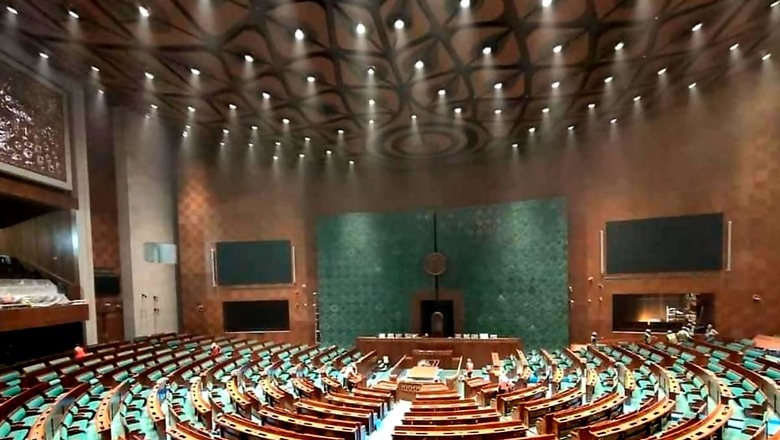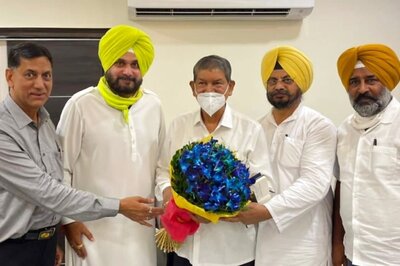
views
The Delimitation Commission of India is one powerful organ. It possesses two critical functions. The first constitutes determining boundaries of Assembly and Lok Sabha constituencies based on censuses. The second, as stipulated by Article 82 of the Constitution, requires that the number of Lok Sabha seats per state is recalibrated after each census, by the Delimitation Commission, in accordance with the population numbers and ratios of all states.
The second function has remained dormant for nearly fifty years since the Emergency. The last census upon which delimitation took place was conducted in 1971. In 1976, then Prime Minister Indira Gandhi placed a suspension on the delimitation of seats for 25 years, until 2001. Such suspension has been kept in place in part, in reflection and virtue of long-standing efforts within the country to pursue a progressive, gradual, yet substantive shift towards greater reproductive responsibility. As V. Venkatesan noted in an article for The Hindu in 2001, the Constitution (Ninety-First) Amendment Bill was implemented to ensure that states were not penalised for soundtrack records in family planning and containing their population growth rates.
Any delimitation would have very real and significant implications for all states in the country. The Finance Commission currently apportions funds based on population figures from the 1971 census. The corollary here is that states should not be punished for advancing socio-economic development and improving the average quality of life of their citizens. Indeed, as Prime Minister Narendra Modi himself acknowledged in a 2019 speech, there remains an active and patriotically rooted case for population control within India.
As it stands, the current suspension will expire by 2026. Prime Minister Modi inaugurated the new Parliament building, one with a vastly expanded capacity of 888 for the Lok Sabha and 384 for the Rajya Sabha. Ensuing this move is a nascent flurry of speculation that a new delimitation will be undertaken in three years’ time and, should prior rules of allocation apply, this could prove to be a seismic move in India’s parliamentary history.
One of us is an Oxford-based political science scholar. The other works extensively on public policy and politics in Tamil Nadu. We both have limited and positionality-shaped attitudes towards the delimitation issue. Neither of us has a perfect grasp of what Indian democracy should or should not be. Yet, at the end of the day, we remain convinced that there are certain guiding principles that should prove to be rather uncontentious for all who truly care for the democratic future of this dynamic, fascinating country.
The first consideration is that the best-performing democracies are often ones that are undergirded by a unifying sense of purpose and commitment to national development. Economically productive states, buoyed by slower population growth rates and more concentrated investment into the stock of human capital, play a key role in ensuring India’s continued rise on the global stage as a genuine powerhouse. India’s three richest states (Maharashtra, Tamil Nadu, Gujarat) are three times richer than its three poorest states and have also been some of the most forward and compliant states on the front of population management. A state’s successful management of fertility rates goes hand-in-hand with strengthening its economic bargaining power, quality of innovation, and investability. For Indian democracy to sustainably flourish, we must take into account the incentive and stakes engendered by public policies, especially when it comes to something as fundamental as the level of representation on the national level.
The second consideration concerns fairness. Fair play is necessary but insufficient for democracies to succeed. As it stands, the Indian political system is somewhat skewed against more economically developed states, which include but are not limited to states in the South. With 21 percent of the national population, south Indian states contribute over 30 percent of India’s national GDP. Select states such as Maharashtra, Gujarat, Haryana, and Tamil Nadu received less than Rs30 from the Centre—in the form of taxes devolved and other transfers—for every Rs100 they contributed to the Central exchequer in 2016-17, whilst states such as Bihar and Uttar Pradesh received around 200% and 150%, respectively of what they contributed. Reforms since then have not performed the much-needed redistribution in favour of states that have taken up the lion’s share of burdens in driving the Indian economy forward through digitalisation and agrarian modernisation. Indeed, a delimitation, at this point, would only further exacerbate already-rife inequalities that place into question the fairness of the fiscal system. If we believe that democracies should recognise hard work, net utility, and economic productivity as instrumental in establishing institutional fairness, then we must think twice about delimitation as a practical proposition.
The third consideration pertains to the importance of balancing the plurality of interests and demographic groups whose buy-in is vital to the sustenance of the Indian democratic project. Estimates suggest that the new delimitation would give rise to 222 seats for Uttar Pradesh and Bihar (as compared with 120 at present) and 165 for the five Southern states (129 at present). The net result is a substantial reduction in the proportion of seats for states that have adopted more proactive measures in restraining population growth over the past decades. To put this into further perspective, the proportion of seats accorded to states with prominent Hindu majorities may increase from 40 percent in the status quo to about 51 percent, whilst reducing the percentage of MPs in non-Hindu-majority states in the South from 25 percent to 18 percent.
For context, India’s ruling party, the Bharatiya Janata Party (BJP) has managed to win less than one-sixth of the parliamentary seats in the South and yet has consistently consolidated its popularity across vast swathes of North India. The authors of this piece do not agree completely with simplistic narratives portraying this as purportedly unfair or procedurally unjust. The level of support the BJP has enjoyed across vast swathes of the Indian demographic should be acknowledged. Yet, such support must be weighed up and balanced against the interests, preferences, and values of states that fall outside conventional BJP strongholds. Both the North and the South matter. Regional representation is crucial towards long-term democratic stability.
Here, a commonly lodged challenge is that without the upcoming delimitation, the average number of people represented by each seat in the Lok Sabha would vary precipitously across states, thereby precipitating an inequality in representation. Surely, if we accept the premise that all should be equal in democracies, then we should also grant every citizen equal weight and capacity in affecting the composition and decision of their national legislature. Are we, not all equal?
Yet, such an unctuous argument merely conceals the underlying problem that has long plagued Indian democracy: the fundamental hegemony of the First-Past-the-Post (FPTP) system gives rise to unhealthy, winner-take-all vicious politics on a state-based level. It renders the case that all who vote for candidates who do not belong to the plurality-winning party within a particular constituency, are fundamentally voiceless. It means that a party with perhaps just slightly over 30 percent vote share in a constituency can acquire the purported right to rule with a complete majority, shutting out the remaining 70 percent of voters who may be split between four to five parties.
We do not dispute that voters should bear in part the responsibility for the outcomes of their votes. Nevertheless, we would do well to remember that FPTP tends to work best in small or medium-sized homogenous countries where ethnic rifts and sectarian rivalries are less stark and apparent. For instance, the United Kingdom (where even there, the system has come under substantial criticism for its failure to capture accurately the general will of the public). In a country as heterogeneous and complex as India, the quest for preserving a healthy, thriving democracy motivates an electoral system that can proportionately and accountably represent the voices of all individuals, regardless of their race and ethnicity, religiosity or caste. A system that enables any party to claim de facto total control over a region through locking in support of 30-35 percent of the local population, is not a sound system.
The above has exposed a tragic fact of reality. As it stands, Indian citizens are not equals in the status quo. Delimitation would not only exacerbate the disparities between states and regions, but it would also conceal the underlying roots of the democratic deficit we experience today. Most worryingly, it pits Indian citizens against one another across arbitrary and divisive cleavages — North vs South, Tamil-majority vs Hindi-majority states, so on and so forth.
The Indian citizenry, in theory, united by our shared love for a multi-ethnic, cosmopolitan, and all-encompassing Indian identity, could well be split asunder by the untimely reopening of historical wounds and ideological debates. India could do better than to submit to the volatility and vicissitudes of ceaseless and ultimately futile bickering over the number of seats assigned to different states and cities. It could do better by focusing on improving the accountability of the Union government to its people, and strengthening of ties and mutual assistance between wealthier and poorer states, without imposing undue burdens or restrictions on voters.
We believe the future of Indian democracy can be bright, but only if pragmatism and prudence prevail over the question of delimitation.
Salem Dharanidharan is a spokesperson for the Dravida Munnetra Kazhagam (DMK) and a co-founder of the Oxford Policy Advisory Group; Brian Wong is a Rhodes Scholar and DPhil in Politics candidate at Balliol College, University of Oxford, and a co-founder of the Oxford Policy Advisory Group. Views expressed are personal.




















Comments
0 comment